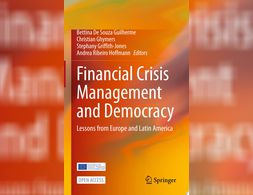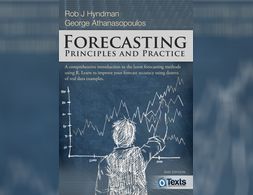✕
217 results
Photo by timJ on Unsplash Do you wish to know how to analyze and solve business and economic questions with data analysis tools Then Econometrics by Erasmus University Rotterdam is the right course for you as you learn how to translate data into models to make forecasts and to support …
Getting to the policy discussion table is one of the objectives pursued by feminist scholars and advocates. However, some participants in this process have remarked that “you cannot get to the policy discussion table until you have proven that you can crunch the numbers.”
Understanding the financial crisis from four very different economic theories: Social Economics, Institutional Economics, Post Keynesian economics.
This syllabus provides an overview of the content of the Philosophy and Economics course at the University of Waterloo.
Identify the historical and cultural systems driving globalization and changing societies around the world.
How can we get people to save more money eat healthy foods engage in healthy behaviors and make better choices in general There has been a lot written about the fact that human beings do not process information and make decisions in an optimal fashion This course builds on much …
This statistics and data analysis course will introduce you to the essential notions of probability and statistics We will cover techniques in modern data analysis estimation regression and econometrics prediction experimental design randomized control trials and A B testing machine learning and data visualization We will illustrate these concepts with …
From religious leaders to heads of state, everyone is talking about economic inequality. What form can such inequality take in different countries? What impact does it have on society? And why should it matter to you?
Explore the pressing topic of globalisation and how it affects economics, politics and society with this online course.
In this course you will learn the basics for developing economically viable climate resilient plans The course starts with a review of the scientific consensus on changes in climate patterns and projections to the future and explains the rationale for countries to develop climate resilient plans that will help them …
The Routledge Handbook of Heterodox Economics presents a comprehensive overview of the latest work on economic theory and policy from a 'pluralistic' heterodox perspective.
Contributions throughout the Handbook explore different theoretical perspectives including: Marxian-radical political economics; Post Keynesian-Sraffian economics; institutionalist-evolutionary economics; feminist economics; social economics.
What is James Tobin's main contribution? What is Arrow's impossibility theorem? Which economists have made the most significant contribution to rational expectations? These and countless other questions are resolved in this eloquently written unique book by Mark Blaug, one of the most prominent historians of economic thought.
The complex economic problems of the 21st century require a pluralist, real-world oriented and innovative discipline of economics that is capable of addressing and teaching these issues to students. This volume is a state-of-the-art compilation of diverse, innovative and international perspectives on the rationales for and pathways towards pluralist economics teaching.
This book provides a new methodological approach to money and macroeconomics. Realizing that the abstract equilibrium models lacked descriptions of fundamental issues of a modern monetary economy, the focus of this book lies on the (stylized) balance sheets of the main actors. Money, after all, is born on the balance sheets of the central bank or commercial bank.
Economic theory is currently at a crossroads, where many leading mainstream economists are calling for a more realistic and practical orientation for economic science. Indeed, many are suggesting that economics should be reconstructed on evolutionary lines.
This book is about the application to economics of evolutionary ideas from biology.
This book is about the application to economics of evolutionary ideas from biology.
More than a century after Hartley Withers's "The Meaning of Money" and 80 years after Keynes's "Treatise on Money", the fundamentals of how banks create money still needs explaining and this book meets that need with clear exposition and expert marshalling of the relevant facts.
Economics After the Crisis is an introductory economics textbook, covering key topics in micro and macro economics. However, this book differs from other introductory economics textbooks in the perspective it takes, and it incorporates issues that are presently underserved by existing textbooks on the market. This book offers an introduction to economics that takes into account criticisms of the orthodox approach, and which acknowledges the role that this largely Western approach has played in the current global financial and economic crisis.
This book argues that mainstream economics, with its present methodological approach, is limited in its ability to analyze and develop adequate public policy to deal with environmental problems and sustainable development. Each chapter provides major insights into many of todays environmental problems such as global warming and sustainable growth.
The book deals with the financial instability hypothesis of Hyman P. Minsky and its application to current developments. The first part of the work summarizes the hypothesis and mentions works elaborating the hypothesis. The second part applies the hypothesis to the financial crisis 0f 2008/09.
Thinking in Systems, is a concise and crucial book offering insight for problem solving on scales ranging from the personal to the global. Edited by the Sustainability Institute's Diana Wright, this essential primer brings systems thinking out of the realm of computers and equations and into the tangible world, showing readers how to develop the systems-thinking skills that thought leaders across the globe consider critical for 21st-century life.
Latin America and Europe can both learn from their respective experiences on crisis response and the distributive and democratic implications at national and regional level Democratic and distributive aspects of crisis response monetary financial economic policies and institutional reforms are key but have not been adequately addressed in the literature …
When Santa Fe Institute Scientists first started working on economics more than thirty years ago, many of their insights, approaches, and tools were considered beyond heterodox. These once-disparaged approaches included network economics, agents of limited rationality, and institutional evolution—all topics that are now increasingly considered mainstream.
This groundbreaking collection explores the profound power of Social Reproduction Theory to deepen our understanding of everyday life under capitalism. It tackles issues such as child care, health care, education, family life and the roles of gender, race and sexuality, and shows how they are central to understanding the relationship between economic exploitation and social oppression.
Including contributions by: Lise Vogel, Nancy Fraser, David McNally and Susan Ferguson.
Forecasting is required in many situations. Stocking an inventory may require forecasts of demand months in advance.
In this new book Smith returns to Solow s classic productivity paradox which essentially states that we can see automation everywhere like the spheres of leisure sociality and politics but not in the productivity statistics He examines why labor saving automation in the service age in the Global North has …
"Specialise!" is the advice often given by career advisers, school teachers and the like. David Epstein takes the opposite position: In an ever more specialised, highly complex world, it pays to have good old-fashioned broad common knowledge in as many areas as you take interest in, both in terms of intellectual curiosity and professional success. To have a decent grasp of various aspects of life means to be able to discern the links between them, thus developing a better understanding of how our world works and what drives events as they unfold.
This course offered by the International Monetary Fund (IMF) on edX provides an introduction in the major econometric tools used in standard Macroeconomics.
Economics is extremely sick. It is so locked in its past that nearly all of its introductory textbooks are modelled on one that appeared in 1948. The discipline cannot continue in its autistic state much longer.
The world's leading economist of inequality presents a short but sweeping and surprisingly optimistic history of human progress toward equality despite crises, disasters, and backsliding.
Money is the fantasy that makes the world go round. Where did it come from and what is its future? From the Bank of England to Bitcoin and the Bristol Pound, LSE sociologist Nigel Dodd explores.
This course describes Bayesian statistics in which one s inferences about parameters or hypotheses are updated as evidence accumulates You will learn to use Bayes rule to transform prior probabilities into posterior probabilities and be introduced to the underlying theory and perspective of the Bayesian paradigm The course will apply …
The Learning Economy and the Economics of Hope' brings together the most important contributions by an expert on policies, management and economics of innovation and knowledge. It offers original insights in processes of innovation and learning and it draws implications for economic theory and public policy. It introduces the reader to important concepts such as innovation systems and the learning economy.
We use cookies on our website. Click on Accept to help us to make Exploring Economics constantly better!
























